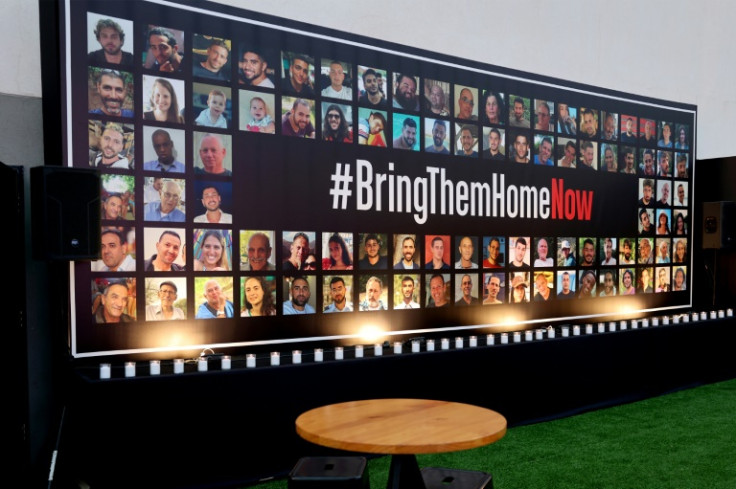Israel Marks One-Year Anniversary of Deadly Hamas Attack as War Expands into Lebanon

Israel marks on Monday the one-year anniversary of Hamas's deadly October 7 attack, the worst in its history and one that sparked a devastating war in Gaza that has since expanded into Lebanon.
With troops fighting what Israel says is a war for its very existence, people gathered at vigils at massacre sites and rallies calling for the return of hostages still in Gaza a year on from their abduction.
The October 7 attack killed 1,205 people according to official Israeli figures, and with the trauma far from healed, families of the dead attending a memorial cried as President Isaac Herzog met the crowd.
Herzog began the day with a moment of silence at 6:29 am -- the exact time the attack began -- at Kibbutz Reim, the site of the Nova music festival where at least 370 people were killed by heavily armed Hamas fighters in the deadliest attack that day.
In the city of Tel Aviv, too, families of hostages and supporters rallied before dawn to call for the return of their loved ones, holding banners and placards bearing their pictures.
The anniversary comes with Israel still fighting in Gaza and engaged in a new war to the north in Lebanon against Hamas ally Hezbollah.
It is also preparing its retaliation against Iran over its missile attack last week, raising fears of all-out regional war.
Hamas and its Lebanese allies vowed to keep fighting, with the Palestinian militants describing their attack as "glorious" and Hezbollah branding Israel as a "cancerous" entity that must be "eliminated".
Around the world, events were organised to pay tribute to the victims of Hamas's attack and others to voice support for the Palestinian people after a year of war in the Gaza Strip.
"Coming to this event one year after this terrible massacre that happened on October 7, it's very touching," said organiser Solly Laniado at a ceremony on Sunday in Tel Aviv to remember the victims of the Nova attack.

The Israeli army said Monday that at least four projectiles were fired from Gaza just minutes after the commemorations began, adding it had "struck Hamas launch posts and underground terrorist infrastructure throughout the Gaza Strip".
Hamas's armed wing said in a statement that its fighters had fired rockets at "enemy gatherings" near the border with Gaza.
It later said it had fired a barrage of rockets at Tel Aviv.
The military said sirens sounded Monday in northern and central Israel, which has experienced daily rocket fire from Lebanon and Gaza.
In a statement, Herzog said the world "must support Israel in its battle against its enemies".
In the early hours of October 7, 2023, Hamas launched its attack by firing thousands of rockets towards Israeli border communities.
At the same time Hamas fighters stormed across the border and attacked nearly 50 different sites, including kibbutzim communities, army bases and the Nova music festival.
Militants killed festival-goers en masse and went door-to-door in farming communities, shooting residents dead in their homes.
Hours later, Israel launched a military offensive on Gaza that has reduced swathes of the territory to rubble, and displaced nearly all of its 2.4 million residents at least once amid an unrelenting humanitarian crisis.
Hamas's October 7 attack resulted in the deaths of 1,205 people, mostly civilians, according to an AFP tally based on the latest official Israeli figures.

Some 251 people were captured and taken as hostages to the Gaza Strip, of whom 97 are still held captive in the coastal territory, including 34 the Israeli military says are dead.
An Israeli campaign group on Monday announced the death of a hostage held in Gaza named Idan Shtivi, 28, who was abducted at the Nova festival.
In retaliation for the attack, Prime Minister Benjamin Netanyahu vowed to crush Hamas and to bring home all the hostages.
"A year ago, we suffered a terrible blow. Over the past 12 months, we have completely transformed reality," Netanyahu said on Sunday during a visit to the Lebanon border.
With Israel expanding the focus of its war to Lebanon, Netanyahu has promised to ensure tens of thousands of Israelis forced to flee Hezbollah fire are able to return to their homes.
Since last month, Israel has conducted massive strikes on Hezbollah strongholds around Lebanon and launched ground operations across the border.
The war has killed more than 1,110 people in Lebanon and forced more than one million to flee their homes.
To the south, Israel's campaign in Gaza is far from over, with the military saying it has encircled the Jabaliya area after indications Hamas was rebuilding there.
Rescuers said 17 people, including nine children, had been killed on Sunday by Israeli air strikes on the area.

According to the health ministry in Hamas-run Gaza, 41,909 people, the majority civilians, have been killed in the territory since the start of the war. The figures have been deemed to be reliable by the United Nations.
On the ground, people are yearning for an end to the violence.
"If I had known that the war would last a whole year, I would never have moved from northern Gaza," Mona Abu Nahl, 51, told AFP in Deir al-Balah, in the central Gaza Strip.
"We no longer have the energy to bear all this... I would have put a tent over my destroyed house and sat down, rather than endure this humiliation, hunger and displacement," she said.
"It feels like the world stopped on October 7," said another displaced person, Israa Abu Matar, 26.
"I have grown old while watching my children hungry, scared, having nightmares and screaming day and night from the sound of the bombing and shells."
Tehran on Sunday said it had prepared a plan to hit back against any possible Israeli reprisal, before Israel's Defence Minister Yoav Gallant warned Iran it could end up looking like Gaza or Lebanon's capital Beirut.
© Copyright AFP 2024. All rights reserved.






















